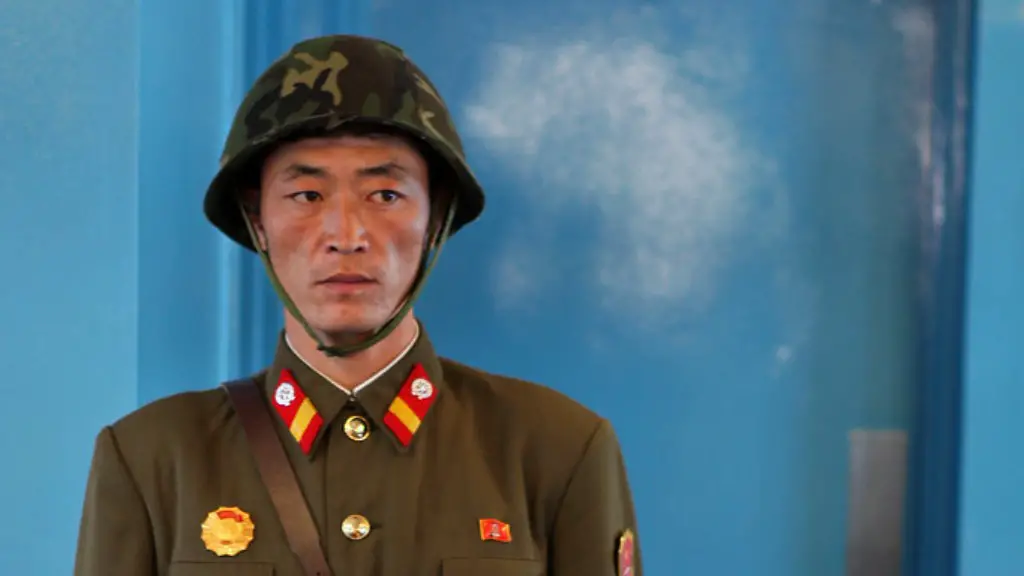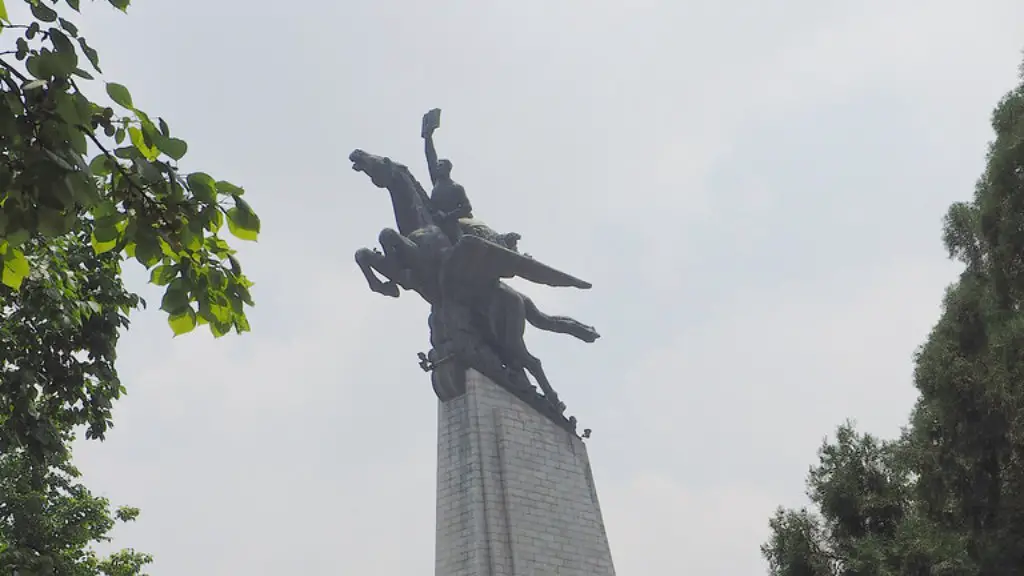1. Political Background of North Korea’s Nuclear Program
North Korea has been developing its nuclear weapons program since the late 1950s, purposely accelerating its efforts in the late 1980s and early 90s. In 1993, the United Nation imposed economic sanctions on North Korea in an effort to stop the production of nuclear weapons.
In response, North Korea signed the Agreed Framework in 1994, agreeing to a full freeze of its nuclear weapons program. North Korea pulled out of the agreement in 2002, blaming the U.S. foreign policy for its failure to deliver on its promises.
Yet North Korea’s nuclear activities did not halt until 2006, when North Korea finally conducted its first test of a nuclear weapon. The International Atomic Energy Agency (IAEA) sanctions against North Korea further tightened in response, yet North Korea’s nuclear ambitions did not cease.
Throughout the years, North Korea has continued to conduct numerous missile tests and nuclear detonations, openly flaunting its attempts to create intercontinental ballistic missiles that can reach distant Europe and the U.S.
2. Why is North Korea Building Missiles and Nuclear Weapons?
North Korea’s accelerated attempts to build missiles and nuclear weapons are largely motivated by its desire to protect its sovereignty from outside interference. As a result of its isolation and lack of external support, North Korea has become increasingly paranoid about seeking military escalation to force its enemies to make diplomatic concessions.
North Korea’s leaders view nuclear weapons and long-range missile capabilities as a source of power and prestige. The country has also increasingly seen nuclear weapons as a way to get economic sanctions lifted, as they believe they can negotiate from a position of strength when they have the ability to threaten other countries.
Additionally, North Korea’s leadership is largely driven by the cult of personality created by Kim Jong-Un and the legacy of his father, Kim Jong-Il. As such, they view the development of nuclear weapons and missiles as a source of national pride and prestige, and want to showcase their capabilities to the world.
3. Where is North Korea Going to Bomb?
The truth is that nobody knows for sure where North Korea is going to target its nuclear weapons. North Korea’s leadership is largely unpredictable and any missile launches or nuclear tests are done in secret.
Given the pattern of North Korea’s missile testing, however, analysts have speculated that North Korea is primarily targeting Japan and South Korea, as the country has recently been deploying missiles in a manner pointing towards both countries. These missiles likely contain chemical or biological warheads, making them a serious threat to both countries.
Additional speculation indicates that North Korea may also target the U.S. at some point in the future. North Korea has long viewed the U.S. as a primary threat to its sovereignty, and has been testing long-range missiles capable of reaching the U.S. mainland.
4. Will North Korea Actually Use Its Nuclear Weapons?
While the prospect of a nuclear confrontation with North Korea is worrying, most experts agree that North Korea is ultimately motivated by the desire to achieve political concessions, not to actually initiate a nuclear war.
In order to achieve its goals, North Korea needs to maintain some level of stability with its adversaries. This means that the North Korean leadership is likely not willing to risk an all-out war with major countries such as the U.S. that could spell doom for the entire regime. Analysts also speculate that North Korea is unlikely to use nuclear weapons even against smaller countries such as Japan or South Korea, as they could potentially lead to an escalated military response from the U.S.
At the very least, analysts suggest that North Korea, in order to achieved its political objectives, is likely to keep nuclear weapons as a deterrent and a last resort, rather than use them in a proactive manner.
5. How is the International Community Responding?
The international community has largely responded to North Korea’s nuclear ambitions with a combination of sanctions and negotiations. The United Nations Security Council has imposed several rounds of sanctions on North Korea, which have largely limited the country’s ability to purchase arms or finance its nuclear program.
Additionally, several countries, most notably the U.S. and South Korea, have attempted to negotiate with North Korea in order to dissuade it from further testing and deploying nuclear weapons. The U.S. has in recent years engaged in several rounds of negotiations with North Korea, culminating in the Singapore Agreement of 2018.
So far, however, these diplomatic efforts have largely been unsuccessful, and North Korea has continued to pursue its nuclear ambitions despite the international community’s best efforts to deter it.
6. Can Economic Sanctions Really Deter North Korea?
The effectiveness of economic sanctions in deterring North Korea’s nuclear ambitions is debatable. On one hand, economic sanctions have largely hampered North Korea’s ability to raise finances, purchase arms, and develop its nuclear program.
Yet economic sanctions have been in place since 1993, and the North Korean leadership has largely been able to bypass them through the help of its allies, most notably China and Russia. This has enabled North Korea to pursue its nuclear program by relying on external sources of funds.
Additionally, the international community has largely failed to successfully deter North Korea’s nuclear ambitions through negotiation, suggesting that its current tactics for dealing with North Korea are ineffective.
7. What can be Done to Stop North Korea?
In light of North Korea’s continued pursuit of nuclear weapons, several experts have argued for a different approach to dealing with the standoff. Specifically, they argue that focusing on increasing economic ties and strengthening diplomatic relations could be the key to ultimately convincing North Korea to abandon its nuclear program.
By opening up access to international markets and giving North Korea access to the international economy, this would provide the country with an alternative to nuclear weapons as a way to increase its power and prestige. This could also allow for more international cooperation, as North Korea would increase its dependence on external assistance and have more of a stake in global politics.
Furthermore, increased diplomatic efforts could also help to create long-term trust and understanding between North Korea and other countries. This could be especially effective as North Korea is largely driven by the cult of personality created by its leadership, and would respond positively to diplomatic efforts that recognize its needs and concerns.
8. Are Military Options Viable?
The use of military force in order to stop the progress of North Korea’s nuclear program is highly debatable. On the one hand, military action could potentially cause significant damage to North Korea’s military infrastructure and deter its nuclear program.
However, the costs of initiating such a conflict could be immense. A war with North Korea would likely bring catastrophic destruction to the region, as North Korea would have little to lose in terms of its infrastructure and military forces. Such a conflict would likely also lead to a severely escalated international conflict, bringing many other countries into the fray and further raising the stakes.
Given the potential costs of such a conflict, most experts agree that military action should be a last resort and that only diplomatic solutions should be pursued until a political solution can be reached.
9. What Does the Future Hold for North Korea?
The future of North Korea’s nuclear ambitions is uncertain. On one hand, the country is continuing to push ahead with its nuclear program and has little incentive to abandon it. On the other hand, the international community has been largely unable to come up with an effective strategy to convince North Korea to disarm and is running low on effective diplomatic solutions.
Ultimately, the future of North Korea’s nuclear weapons program depends on the country’s leaders changing their views and viewing negotiation as an acceptable option. The international community must continue to push for diplomatic solutions and continue to engage with North Korea on a political level in order to foster trust and understanding between the two sides.
Only then can the crisis be solved and North Korea be convinced to stop its pursuit of nuclear weapons.
10. Is North Korea Holding the World Hostage?
North Korea’s increasingly belligerent behavior and openly provocative statements have created a situation in which the country is seen by many as holding the world hostage to its nuclear ambitions. As a result, North Korea has largely been ostracized from the international community and branded a “rogue state” by the United Nations security council.
International organizations and countries have made numerous attempts to hold North Korea accountable and pressure it into abandoning its nuclear ambitions. Yet many of these efforts, such as economic sanctions, have so far been unsuccessful and North Korea’s leaders appear to be largely unperturbed by the threats of the international community.
Moreover, North Korea has largely been able to bypass any economic sanctions that were implemented, suggesting that they are having little impact on the regime’s ability to pursue nuclear weapons. As such, North Korea can arguably be seen as holding the world hostage to its nuclear ambitions with little incentive to actually disarm.


